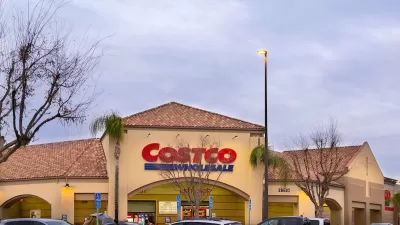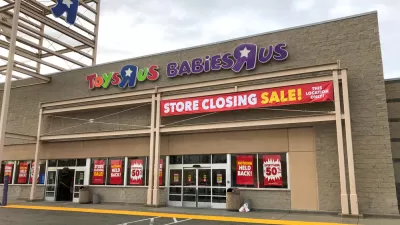To deal with the problem of vacant big-box stores that have proliferated across the country, one Milwaukee suburb is levying a fee on developers to help pay for demolition. Other cities are exploring similar options.
"Like many communities across the country, Wauwatosa has taken steps to protect itself against so-called ghost boxes, the hulking remains of what are often big box stores left vacant when retailers downsize or relocate.
Many see measures such as Wauwatosa's, which assesses developers a fee that can be used for demolition if needed, as counterproductive to attracting new business.
But recent announcements of store closings by Home Depot and Linens 'n Things - and concerns that more could follow - have some economic development officials reconsidering."
"Wauwatosa's provision, adopted as part of its big-box ordinance in 2005, requires developers of buildings 50,000 square feet and larger to set aside 20 cents a square foot in the city's land conservation fund - about $28,000 in Lowe's case - which can be tapped to raze the building if it sits empty for more than a year.
"This is exactly the climate we were anticipating when we adopted this," Wauwatosa Community Development Director Nancy Welch said shortly after Home Depot announced this month that it would close 15 stores, including three in Wisconsin.
Widely criticized in the development community at the time, Wauwatosa's provision has been touted by the American Planning Association as one of the innovative ways communities can protect themselves if a retailer departs.
Others include higher architectural standards that make buildings easier to reuse; requiring developers to take out demolition bonds; and banning clauses in leases that prohibit the owner of a building, once vacated, from renting it to a retailer's competitor."
FULL STORY: Razing fees for big box stores get 2nd look

Planetizen Federal Action Tracker
A weekly monitor of how Trump’s orders and actions are impacting planners and planning in America.

Congressman Proposes Bill to Rename DC Metro “Trump Train”
The Make Autorail Great Again Act would withhold federal funding to the system until the Washington Metropolitan Area Transit Authority (WMATA), rebrands as the Washington Metropolitan Authority for Greater Access (WMAGA).

DARTSpace Platform Streamlines Dallas TOD Application Process
The Dallas transit agency hopes a shorter permitting timeline will boost transit-oriented development around rail stations.

Supreme Court Ruling in Pipeline Case Guts Federal Environmental Law
The decision limits the scope of a federal law that mandates extensive environmental impact reviews of energy, infrastructure, and transportation projects.

Texas State Bills to Defund Dallas Transit Die
DART would have seen a 30% service cut, $230M annual losses had the bills survived.

Bikeshare for the Win: Team Pedals to London Cricket Match, Beats Rivals Stuck in Traffic
While their opponents sat in gridlock, England's national cricket team hopped Lime bikes, riding to a 3-0 victory.
Urban Design for Planners 1: Software Tools
This six-course series explores essential urban design concepts using open source software and equips planners with the tools they need to participate fully in the urban design process.
Planning for Universal Design
Learn the tools for implementing Universal Design in planning regulations.
Roanoke Valley-Alleghany Regional Commission
City of Mt Shasta
City of Camden Redevelopment Agency
City of Astoria
Transportation Research & Education Center (TREC) at Portland State University
US High Speed Rail Association
City of Camden Redevelopment Agency
Municipality of Princeton (NJ)





























